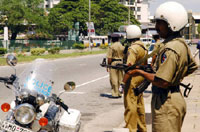Sri Lankan troops scour Colombo suburbs;7 rebels killed
Seven Tamil Tiger rebels were killed in new fighting with Sri Lankan government troops. Schools were closed and security forces scoured the capital after two deadly bomb attacks.

The blasts Wednesday, blamed on the Tamil Tigers, killed a total of 18 people and sent a wave of fear throughout the country's main city that the rebels had changed their tactics and were now targeting civilians.
The worst explosion tore through the entrance of a department store in a Colombo suburb during the evening rush hour, while an earlier suicide bombing targeted a Cabinet minister in his offices in the capital.
The government said the attacks proved its campaign to crush the rebels after more than two decades of warfare was badly damaging the group.
"In a terrorist movement, when they are probably on their last leg, you have to expect the worst," government spokesman Keheliya Rambukwella said. "As a result, we have beefed up security in certain unidentified areas."
The military, which already maintained a maze of checkpoints throughout the capital, sent more forces into the streets, and intelligence agencies were directed to redouble their efforts to prevent future attacks, he said.
In response to a government appeal for renewed vigilance, hundreds of people called the security forces to report suspicious packages and possible bombs, including one that sent troops to a popular Colombo shopping mall on a search that turned up nothing, security officials said.
Meanwhile, the military pressed ahead with attacks Thursday on the Tamil Tiger rebels in their de facto state in part of northern Sri Lanka.
In a series of early morning attacks on rebel bunkers in the Jaffna peninsula, troops killed seven Tamil Tiger fighters, the military said. The military also announced it had killed 23 rebels in fighting Wednesday, much of it before the department store bombing.
Rebel spokesman Rasiah Ilanthirayan did not answer repeated calls from The Associated Press seeking comment about the fighting or the bombings.
The attack at the popular No Limits store in Nugegoda on Wednesday evening killed 17 people, sent piles of crumbled concrete pouring onto the sidewalk and scattered twisted, charred pieces of motorcycles and three-wheeled taxis around the area. Dozens of others were injured.
An earlier suicide bombing targeting Social Services Minister Douglas Devananda, who leads a rival Tamil group, killed one person at his office in Colombo. Devananda was not injured, officials said.
The attacks came a day after the rebels said that 22 civilians, including 11 schoolchildren, were killed in attacks inside rebel-controlled territory. They blamed the military, but the government denied responsibility for the roadside bombing that killed the children.
U.N. Secretary-General Ban Ki-moon condemned the rebel attacks, appealed for an end to the "destructive spiral of violence" and called on both sides to return to peace talks, according to a statement.
London-based Amnesty International called on the rebels, known formally as the Liberation Tigers of Tamil Eelam, to comply with international law and halt such attacks.
"The LTTE must stop any direct or indiscriminate attacks on civilians. They are forbidden under international humanitarian law and are never acceptable," Irene Khan, the group's secretary general, said in a statement.
The Tamil Tigers have been fighting since 1983 to create a separate homeland for Sri Lanka 's minority ethnic Tamils following decades of discrimination by governments controlled by the Sinhalese majority. An estimated 70,000 people have been killed in the fighting.
The rebels, listed as a terror group by the United States and European Union, are responsible for more than 240 suicide bombings. While they routinely attack military and economic targets, they had stopped targeting civilians in recent years, though they have ambushed military convoys amid crowds, causing many civilian deaths.
Subscribe to Pravda.Ru Telegram channel, Facebook, RSS!




